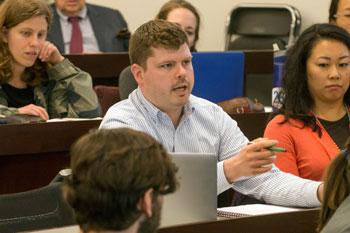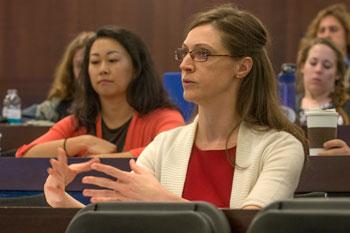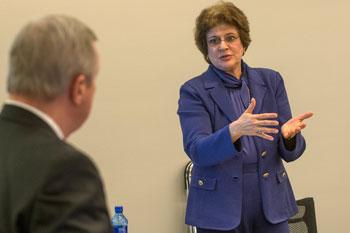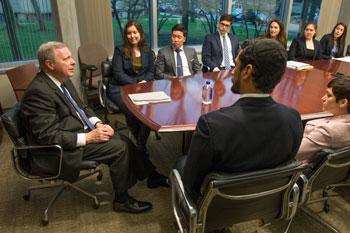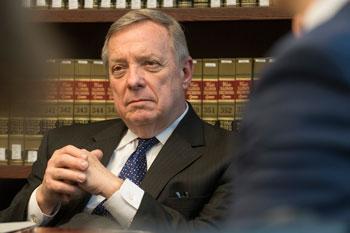US Senator Dick Durbin Visits Law School, Engages Students in Lively and Thoughtful Discussions
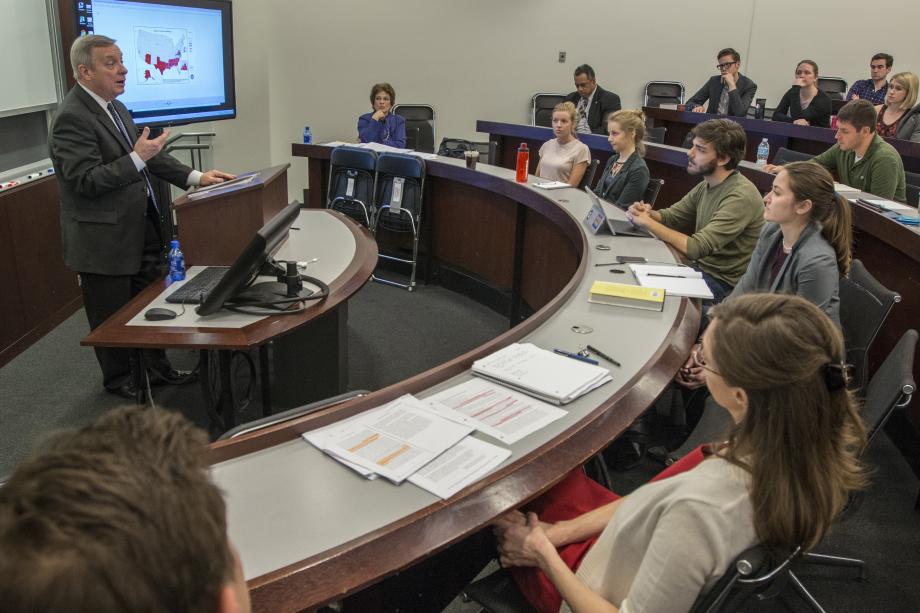
US Senator Dick Durbin (D-Illinois) engaged in a spirited discussion about voting rights during a recent visit to Lecturer Fay Hartog Levin’s Law School seminar, “The Evolving Relationship between the Federal Government and the States,” telling students that “the right to vote is under attack” and offering his expertise and insight on a variety of election issues.
“I was grateful and pleased that Senator Durbin took time out of his busy schedule to address my students and their student guests,” said Hartog Levin, a former US Ambassador to the Netherlands who invited Durbin to visit the Law School. “His topic is one about which he is both knowledgeable and passionate. His experience on the Judiciary Committee is particularly relevant, and I think the students were impressed with the clear-headed and straightforward manner in which Senator Durbin presented his thoughts and arguments.”
Durbin, the second-highest ranking Democrat in the Senate, discussed the impact of the Supreme Court’s 2013 decision in Shelby County v. Holder, which struck down part of the Voting Rights Act of 1965. He said he has been “troubled” since Shelby by the number of states that have passed voter ID and other laws that have made it more difficult to vote.
“These laws are simply an effort to restrict the opportunity to vote for certain Americans,” said Durbin, a cosponsor of the Voting Rights Amendment Act, which essentially would restore the provision requiring states with a history of voting-related discrimination to get federal “pre-clearance” before making changes to their election laws. “We should be working in America to make voting easier.”
Several members of the class, which also includes students from outside the Law School, had the opportunity to engage in a Q&A with Durbin. Their inquiries sparked discussions ranging from gerrymandering to whether elections should be held on Tuesdays to the constitutional argument behind Citizens United v. Federal Election Commission, which is the Supreme Court case that struck down limits on independent spending by corporations in election campaigns.
“My discussion with Senator Durbin anchored my understanding of voting rights in the real, messy world that they inhabit outside of the classroom,” said Luke Rushing, a ’15 Divinity School student who asked about the impact of Citizens United. “His vigorous support for voting rights validated the enthusiasm I have for supporting them as well.”
Added Becca Smith, ’16: “It was definitely exciting to interact with Senator Durbin, hear his thoughts on the restrictive state voting laws, and learn more about how he is working to make it easier for people to vote.” She asked Durbin about the main factors contributing to “hostility toward ease of voting,” noting that she was particularly interested in how the relationship between the states and the federal government factored in.
“I chose the question because, in the seminar, we focus on the changing relationship between the federal government and the states in a variety of fields, and try to analyze what causes or contributes to the shifts in power between the two,” she said later.
Durbin told Smith that he thought the restrictions were largely driven by attempts to gain political advantage and noted that she had raised a “fundamental question.”
“You have a federal/state issue here: federal legislators, when they believe their state is safely in the hands of their party, want to evolve as much authority as possible to the states at every possible level,” he said. “But I think there is a federal role. If we had left civil rights entirely to the states, where would be today?”
He also fielded a question about whether Election Day should be a federal holiday or should move from Tuesday, saying that, “Tuesday is not a bad day of the week, but there’s nothing magical about it.” He said he favors the expansion of voting opportunities, such as weeks-long early voting, as is the case in Illinois, or the ability to vote by mail, as is the case in Oregon.
At one point, Hartog Levin asked the audience how many were registered to vote, how many were registered somewhere other than Illinois, and, of those, how many were able to vote by absentee ballot. A number of hands went up.
“Let’s be honest,” Durbin said, “you’re well-educated and you don’t get discouraged when something is tough. Now put that decision (to vote) and this process in front of someone who is not as well educated, and is busy, and (is thinking) ‘the baby’s crying, and the car didn’t again start this morning, and forget it — I’ll vote next time.’”
A Discussion on Sentencing Reform: ‘What You’re Doing is Meaningful’
While he was at the Law School, Durbin also met with students in Clinical Professor Alison Siegler’s Federal Criminal Justice Clinic, where he praised two “powerful presentations” delivered by clinic students LT Edwards and Elpitha Betondo, both ’15. The students offered deeply human arguments for the proposed Smarter Sentencing Act cosponsored by Durbin. “The SSA is so important because all of the advocacy in the world can do nothing for a client who has no means of avoiding a high mandatory minimum,” Edwards told Durbin. “Sentencing reform efforts like yours have profound effects on the lives of real people.”
During the intimate gathering at the Kane Center — which included a dozen students, Siegler, and Clinical Instructor Judith P. Miller — Durbin appeared thoughtful and nodded several times as Siegler and the students recounted poignant stories that underscored their commitment to keeping their clients’ humanity at the forefront of their advocacy.
“It was a phenomenal experience for our students to meet with a legislator who is such a courageous and impassioned advocate for sentencing reform,” said Siegler, who founded the Federal Criminal Justice Clinic in 2008. “The clinic is so grateful to the Senator for giving us the opportunity to tell him about our own reform efforts and about clients whose lives would be changed by the legislation he has cosponsored. I know the experience will resonate with the students for many years to come.”
Indeed, Betondo said later that presenting in front of Durbin was one of the highlights of her Law School career.
“It was such a unique opportunity to help my client by speaking directly to a senator whose work will affect my client’s liberty,” she said. “Most importantly, Senator Durbin’s work will greatly impact many of the Federal Criminal Justice Clinic’s clients, and it was an honor to speak on behalf of the clinic and my client to show the Senator how important his work is for the clinic and our society.”
Added Edwards: “I saw the law come to life on a national level. As law students, our legal education is often abstract and local, but with Senator Durbin, we were given the chance to potentially influence criminal justice reform nationwide and, in turn, affect lives across the country.”
After they spoke, Durbin addressed the students’ concerns, and Siegler said they were “heartened to hear the Senator talk about the very real possibility that mandatory minimum penalties in drug cases will be rolled back.” He also thanked the students for their commitment.
“There is a difference between a job and a profession, and what you’re responding to is a profession,” he said. “Society gives attorneys the authority to do things that other people cannot do. And I believe it asks us, in return, to give something back to society – and that’s what you’re doing. I think what you’re doing is particularly meaningful because it serves folks who, by and large, are casualties of our economy, our political system, our law enforcement system. When you stand up and achieve justice in these cases, I know there is a great feeling of satisfaction. But equal to that, or even greater: your work verifies that this is a just society, despite its imperfections. If enough people care, they can make a difference in the lives of these people — and it can reaffirm why we’re so proud of this country.”
